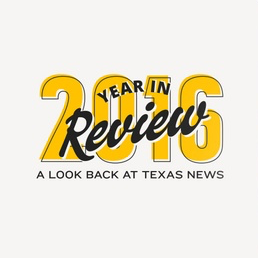Biggest transportation battles of 2016 to continue in the new year
/https://static.texastribune.org/media/images/2016/12/16/TT-year-in-review2016-roads-Midland.png)
2016 Year in Review

For those obsessed with Texas government and politics, 2016 was filled with big news, from the somber (the ambush of police officers in Dallas) to the absurd (University of Texas students toting dildos to protest the new campus carry gun law). And then there was the election. Here's our roundup of the year's most memorable Texas stories.
More in this seriesThe cost of toll roads, the toll of urban congestion, ride-hailing battles and a high-speed train war garnered plenty of attention in Texas this year. And after the Legislature spent two sessions focusing on highway funding, lawmakers now appear poised to tackle other transportation matters next year. Here's a look at the year's biggest transportation stories and how they may continue to unfold in the coming months:
1. Uber and Lyft roll out of Austin after losing city election
National ride-hailing companies Uber and Lyft stopped operating in Austin after voters there rejected an ordinance that would have repealed certain regulations, including the requirement that drivers submit fingerprints for background checks. Several new transportation networking companies entered the Austin market in response.
Uber said in November that it would like to renegotiate regulations with the Austin City Council. Meanwhile, Uber continues operating in Houston, which also requires fingerprint-based background checks. But the issue of ride-hailing regulations appears headed to the Legislature, meaning state lawmakers could do what Austin voters refused to do: override city regulations of the companies.
2. Houston METRO bucks trends of falling bus ridership after route overhaul
The state’s major transit agencies are eyeing changes to their bus operations after Houston METRO overhauled its local routes and schedules and saw an increase in ridership. Austin’s Capital Metro board is slated to vote on an overhaul plan next year. The Dallas City Council directed Dallas Area Rapid Transit to make a bus overhaul there a priority over a new suburban rail line and installed a transit advocate on the board late this year. San Antonio’s VIA Metropolitan Transit, meanwhile, is studying such an overhaul. None of the ones planned, though, would be rolled out overnight like Houston METRO’s changes were.
3. Disdain for toll roads continued, but that won’t be enough to get rid of them
The operators of a 41-mile, tolled stretch of State Highway 130 filed for bankruptcy after lower-than-expected traffic spurred shortfalls in revenue. And the Texas Department of Transportation calculated that it would cost $36.7 billion to pay off construction debt on the state’s network of toll roads, drawing the ire of state lawmakers.
Meanwhile, Dallas Mayor Mike Rawlings asked that TxDOT complete a comprehensive analysis of what would happen to downtown traffic if the city built the controversial Trinity Parkway toll road. And after Donald Trump won the November presidential election, many Texans feared the real estate mogul's infrastructure spending plan (which still lacks key details) could lead to more toll projects in the Lone Star state.
4. With billions in new funds, TxDOT identifies key urban highway projects
After Gov. Greg Abbott campaigned on cutting urban congestion, TxDOT this year started directing billions to highway projects in the state’s biggest cities. The Texas Transportation Commission, which oversees the transportation agency, approved $1.3 billion worth of projects in January. That included improvements to Interstate 35 in Austin, I-35E in Dallas, Interstate 820 in Fort Worth, Interstate 69 in Houston and U.S. Highway 281 in San Antonio. Money for the projects is coming from funds that voters agreed to send to TxDOT for highway construction and maintenance in two separate elections approving amendments to the Texas Constitution.
5. Both sides in bullet train fight prepping for pivotal 2017
A private company’s plans to build a bullet train between Dallas and Houston continued drawing ire from rural Texans, who are fiercely opposed to Texas Central being able to use eminent domain to take needed land for the project. Grimes County officials added bureaucratic requirements, though company officials said the new permitting rules wouldn’t dramatically hinder the project. But both supporters and opponents appeared to spend the year gearing up for a bigger showdown: the 2017 legislative session. Opponents have said for months they intend to try to get legislation to Abbott's desk blocking the project next year. And Texas Central in December encouraged Texans to write their legislators in support of the plan.
Read more year-in-review stories here.
Disclosure: Capitol Metro, VIA Metropolitan Transit, Uber, Lyft and Texas Central Partners have been financial supporters of The Texas Tribune. A complete list of Tribune donors and sponsors can be viewed here.
Information about the authors
Learn about The Texas Tribune’s policies, including our partnership with The Trust Project to increase transparency in news.
/https://static.texastribune.org/media/profiles/Brandon_Formby_2x3.jpg)